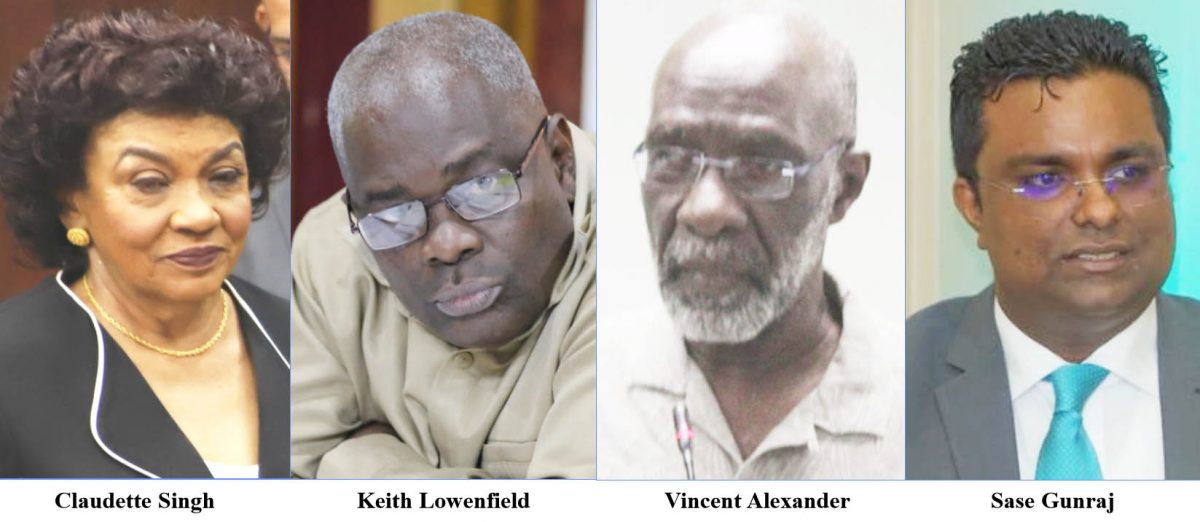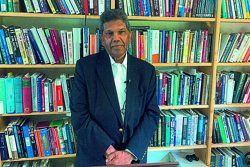GECOM yesterday moved closer to the declaration of the PPP/C as the winner of the March 2nd general elections with Chairperson Claudette Singh setting aside the 10 declarations submitted to the Commis-sion on March 13, 2020 and ordering the embattled Chief Election Officer (CEO) for the fourth time to submit the results of the painstaking recount.
CEO Keith Lowenfield’s new deadline for the report is 2 pm today while a meeting of the Commission is scheduled for 2:30 pm.
Speaking with reporters following another mara-thon meeting of GECOM, government-nominated commissioner Vincent Alexander said that Singh “in a judge-like manner reverted to the 16 June and has instructed the CEO to prepare a report in keeping with the results of the recount.”
“If in any circumstances he does not make that submission [the chair] has already decided that the task with be given to the Deputy Chief Election Officer [Roxanne Myers],” he added.
These 10 declarations had been held in abeyance until the conclusion of the National Recount on June 8. They include the since discredited declaration of District Four Returning Officer, Clairmont Mingo. Opposition-nominated commissioners and the PPP/C had previously urged Singh to remove these declarations but she had said that they would be left in abeyance. Singh has come under mounting local and international pressure to declare the result of the recount.
It had previously been argued by Alexander that the 10 declarations would be “naturally replaced” by the tabulation certificates generated by the recount process but he yesterday claimed that by “strict law” they had “not been contested” and could therefore be used to declare the results. He also claimed that various pronouncements from the Caribbean Court of Justice (CCJ) had “nullified” the recount order, Order 60 of 2020.
Using this argument Alexander along with Commissioners Desmond Trotman and Charles Corbin had sought yesterday to convince the Chair at the GECOM meeting to accept from Lowenfield a report which used some of these declarations to grant the incumbent APNU+AFC victory.
Opposition-nominated commissioner Sase Gunraj later explained that the Chair disagreed with this position.
“[The Chair] emphasized that the Court [CCJ] has nowhere in its judgment set aside [Order] 60, its effect or any aspect of it,” he said, adding that the Chair went on say that the March 13 declarations have been “set aside” and replaced by the recount tabulation certificates.
Justice Singh’s interpretation is in line with the actual wording of the Judgment which stressed that Order 60 cannot and did not affect or alter any constitutional provisions.
At Paragraph 24 the summary judgment in the Eslyn David matter specifically noted that “unless and until an election court decides otherwise, the votes already counted by the recount process as valid votes are incapable of being declared invalid by any person or authority.”
Gunraj noted that the Chair in delivering her directive to Lowenfield referenced this paragraph and stressed that the recount process must be used to find the results of the elections.
According to the opposition-nominated commissioner, Singh further stressed that while Article 177 (2) (b) of the Constitution directs that the Commission should declare results by “acting only in accordance” with the advice of the CEO it does not place the role of the CEO higher than that of the Commission.
“The Commission is not subservient to the CEO,” he explained.
While he supported the Chair’s position on the report submitted by Lowenfield, Gunraj expressed disappointment with the directives given to the CEO.
Thrown it back
“I am disappointed [the chair] did not complete the process but has thrown it back to the CEO who has demonstrated a recalcitrant attitude and a trend of defying specific instructions of the Commission,” he lamented.
Lowenfield was first instructed to submit a report using the recount results on June 16. Instead of complying he submitted a report which invalidated in excess of 115,000 votes cast claiming that his actions were in line with the June 22 ruling of the Appeals Court that “more votes cast” should be interpreted to mean “more valid votes cast”. Accordingly Lowenfield submitted a report of “credible and valid” votes while a three-day stay on the Court’s decision was still in effect.
Upon appeal the CCJ found that not only did the Appeal Court not have jurisdiction but that it was unnecessary to insert the word “valid” at the level of the Constitution since several pieces of subsidiary legislation including the Representation of the People Act (ROPA) already state that only valid votes should and can be used. They also highlighted the fact that a process to determine validity was outlined in ROPA.
“The concept of ‘votes’ is well known to the legislative framework governing the electoral process… The determination of such validity is a transparent exercise that weeds out of the process, for example, spoilt or rejected ballots. This is an exercise conducted in the presence of the duly appointed candidates and counting agents of contesting parties. It is after such invalid votes are weeded out that the remaining “valid” votes count towards a determination of not only the members of the National Assembly but, incidentally as well, the various listed Presidential candidates. If the integrity of a ballot, or the manner in which a vote was procured, is questioned beyond this transparent validation exercise, say because of some fundamental irregularity such as those alleged…then that would be a matter that must be pursued through Article 163 after the elections have been concluded,” the ruling clearly explains.
Following the Court’s ruling Lowenfield was again directed to submit a report of the result of the recount. He did not do so. Instead he wrote to the Commission seeking clarification.
In the letter he argued that the CCJ had found that the order for the national recount was in conflict with the Constitution and a result could not create a new election regime. “Kindly provide guidance on which results of the Elections of 2 March 2020 could be lawfully declared,” he wrote.
He further suggests that Singh’s directive on the preparation of the report suggests a change in procedures from the practice submissions based on declarations from Statutory Officers namely Returning Officers.
In response the Chair again directed that Lowenfield submit a report of “valid votes counted in the National Recount as per the Certificates of Recount.”
Once again the CEO failed to comply with this directive and submitted instead a report using the several declarations from March 13.
While the recount showed a clear victory for the opposition PPP/C, Lowenfield submitted a report reflecting a win by the incumbent APNU+AFC. He has reported 236,777 votes for APNU+AFC, 229,330 for the PPP/C and 5,091 for a joint slate of three new parties.
This report has been rejected by the Commission.










